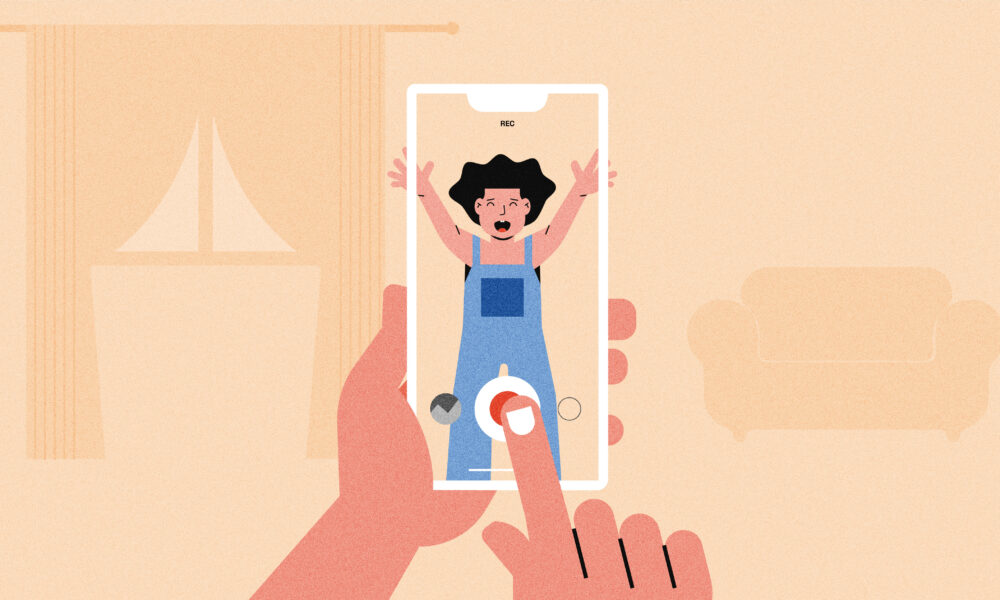In an anonymous letter sent to someone on TikTok, a lady who grew up as the daughter of a mommy blogger spoke about how feeling exploited by her mother and feeling exposed. In the letter, she wrote of her entire childhood and teenage years being monetised, how she couldn’t go out in public without being recognised, and how she sometimes got unsolicited and inappropriate messages from strangers.
We live in a world of content creation. From Instagram to Facebook, TikTok, Twitter and many other social media apps, everyone seems to be creating content around their everyday lives – and are getting recognised and paid for it. We have skit makers, dog owners creating content around their dogs, makeup content creators, tech, interracial couples, fashion and style and so on. And then we have parent content creators or momagers – people who create content around parenthood, children, and family. These parents are known for showing the everyday lives of their children – what they eat, things they wear, things they say and do, where they go, their daily activities, their likes and dislikes and so on. Beyond entertaining, it is a good way to teach other parents about parenting, motherhood/fatherhood, and how to take care of children better. On the flip side, is it really healthy to have your children’s faces splattered all over the internet because of content? For the world to know almost everything about them? Like the TikTok lady, how do you ensure your children are safe from the outside world, from those who may want to harm them or send “unsolicited and inappropriate messages”?
There is nothing wrong with content creation. We live in a digitised world. There are people doing amazing things in the world from the comfort of their homes. There’s Khaby Lame raking in millions for not saying a word. The new world of tech and content creation is one that is full of endless possibilities. So, yes, if parenting content is the new gold mine or the new oil, why can’t parents dig into that? But how do you draw the line when content creation involves other people asides yourself, especially minors who cannot give consent or children who don’t want to grow up and discover they are popular against their own will or without their knowledge or consent? How do you draw the line between parents who are just internet-savvy and those who are internet-obsessed?
In a video that went viral long ago, a mother and daughter were seen bawling their eyes out. POV: Their dog had died and it was a deeply emotional period for them. There were awwns and teary-eyed emojis, it was a cute video, one that not only showed the love they had for the dog, but also showed a bond between a mother and a daughter. Not too long after, another video, mistakenly shared by the mother went viral. In this deeply unsettling video, she was seen shaking and yelling at her daughter to cry. Scared, the little girl burst into tears, the mother immediately wrapped her hand around her, pretended to cry too and captured the moment. She took down the video after so much backlash but it had already been seen and reshared by millions of people online.
How do we protect children from internet-obsessed parents like this? Parents who would do anything including abusing their children for content. Parents who do not mind putting their children in danger just for likes, reshares and brand endorsements.
A mom-led movement that sprung out on TikTok and is aimed against mothers posting pictures and videos of their kids online accused Jacquelyn Paul, a mother to a 3-year-old TikToker (of course, the page is handled by Jacquelyn) of exploiting her kid by posting excessive content about the little girl. This content attracted certain creepy people who followed the account and made disturbing comments under the posts. Elaine Roth for She Knows wrote that older men called the little girl a snack or soft.
Elaine says there are three major risks in posting pictures and videos of kids online. The first is how the kids might be open to danger and harm – identity theft and stalking– because each content contains a traceable link. The second is loss of control over the content – there are images of kids on social media whose faces have been turned into memes, gifs and stickers. The third is how the content might affect the kid’s personal identity in the future. When these kids grow up and see a picture of themselves doing something they would not want to be shared publicly, they might feel embarrassed or disgusted.
Some children are able to handle publicity, others are not. Still, it is important for parents to create boundaries. When it comes to social media, there’s a limit to how much you should share of minors – and, yes, that includes your kids.
Share your story or advertise with us: Whatsapp: +2347068606071 Email: info@newspotng.com
















